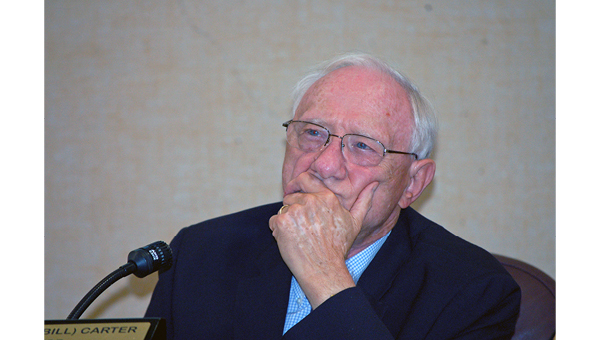State approves COPA for Mountain States, Wellmont merger
Published 8:20 pm Tuesday, September 19, 2017

- Star Photo/Curtis Carden Tennessee Department of Health Commissioner Dr. John Dreyzehner announced Tuesday morning that the COPA application between Mountain States and Wellmont has been approved. Pictured, Mountain States President/CEO Alan Levine, left, and Wellmont President/CEO Bart Hove field questions at a press conference held in Johnson City.
Ballad Health is nearing reality.
Mountain States and Wellmont health systems’ proposed merger took one step forward Tuesday following the announcement by Tennessee Department of Health Commissioner Dr. John Dreyzehner that the Certificate of Public Advantage (COPA) request has been granted.
“This has been an unprecedented and complex process, and I appreciate the time, effort and resources everyone involved has put into making it a productive one. I also appreciate the legal expertise and guidance of the Attorney General and his staff as we’ve put into place measurable goals and terms and conditions to ensure that in granting approval, there is a clear public benefit to the health and well-being of residents of the region.”
With one hurdle out of the way, Mountain States and Wellmont will now await confirmation from Virginia’s Department of Health to OK their COPA.
“Health care is changing and evolving,” Mountain States President/CEO Alan Levine said Tuesday at a press conference held in Johnson City. “When you talk to people about where they want to locate their businesses, where they want to live or where they want to retire, they want a stable, capitalized healthcare system with doctors that can take care of them.”
Levine added they didn’t want to speculate on the status of the COPA talks in Virginia, but Bart Hove, Wellmont president/CEO, indicated talks are still going strong between all parties involved.
“We’re still in the process of sharing information with Virginia,” Hove said. “That process has been going smoothly.”
Both CEOs credited their boards for their work and thanked the state and AG Herbert Slatery for their work. Barbara Allen, former Mountain States Board chair was also thanked for her service during the process.
Ballad Health has also received a fair share of opposition from the Federal Trade Commission. During the last public hearing held at Northeast Tennessee Community College’s Blountville campus, a representative from the organization made it known that the FTC still opposes the merger.
“The COPA is well within the parameters of the law,” Levine said. “We appreciate the work the FTC does. We appreciate their role in this. We’re here working with the state to create something that works for the region.”
Levine added the decision to merge is to put a suitable health system in place for residents of Northeast Tennessee and Southwest Virginia.
“We’re watching it play out Washington right now, they can’t figure out what direction they want to go in for health care,” Levine said. “We’ve always believed states should lead. While they’re debating this in Washington, we’re here on the ground doing it. The reality is, inpatient utilization for patients is declining. We have to come up with alternatives. We have to go where people are. We’re here working with the state to create something that works for the region.”
Supervisory limits were also put in place, according to Levine, which includes a compliance officer, auditor and the new system having to provide reports to make sure the COPA is being followed.
Highlights from the COPA include the system’s commitment to place $300 million worth of spending to benefit health in the region, including the creation of a residential addiction recovery campus to help address the drug epidemic in the area.
Another concern cited was job loss. Levine added that the COPA indicated the rural hospitals are now able to see residents be terminated, without cause. An anticipated 250 jobs are expected to be lost in the short-term from an administrative standpoint, which is a large decrease compared to an estimated 1,000 if the merger is not done locally, according to Levine.
Visit www.tn.gov/health/article/certificate-of-public-advantage to view the COPA in its entirety.





